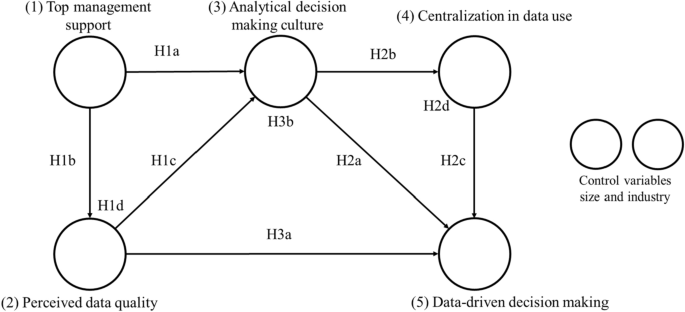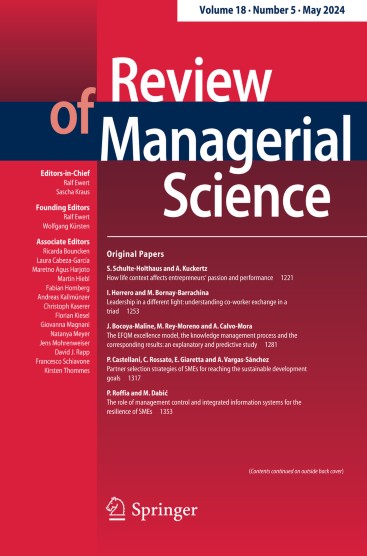走向数据驱动的决策:分析文化和集中工作的作用
IF 7.8
3区 管理学
Q1 MANAGEMENT
引用次数: 0
摘要
数据相关投资的激增引起了管理者和学术界的关注,这是否以及如何(重新)影响决策程序。利用组织的信息处理理论和代理理论,本文阐述了将战略重点放在业务分析上如何支持分析性决策文化,从而在决策过程的每个阶段增强数据的使用,以及信息不对称变化导致的权威的潜在变化。基于对305家大中型企业的调查,本文提出了一个多中介模型。我们为我们的假设提供了支持,即高层管理人员对业务分析的支持和感知数据质量是分析文化的良好预测因素。此外,我们认为分析文化增加了数据使用的集中化,但有趣的是,我们发现这种集中化与数据驱动的决策没有关联。我们的论文提出了在商业分析的新背景下,关于信息技术相关的权力集中化的长期争论。本文章由计算机程序翻译,如有差异,请以英文原文为准。

Towards data-driven decision making: the role of analytical culture and centralization efforts
Abstract The surge in data-related investments has drawn the attention of both managers and academia to the question of whether and how this (re)shapes decision making routines. Drawing on the information processing theory of the organization and the agency theory, this paper addresses how putting a strategic emphasis on business analytics supports an analytical decision making culture that makes enhanced use of data in each phase of the decision making process, along with a potential change in authorities resulting from shifts in information asymmetry. Based on a survey of 305 medium-sized and large companies, we propose a multiple-mediator model. We provide support for our hypothesis that top management support for business analytics and perceived data quality are good predictors of an analytical culture. Furthermore, we argue that the analytical culture increases the centralization of data use, but interestingly, we found that this centralization is not associated with data-driven decision making. Our paper positions a long-running debate about information technology-related centralization of authorities in the new context of business analytics.
求助全文
通过发布文献求助,成功后即可免费获取论文全文。
去求助
来源期刊

Review of Managerial Science
MANAGEMENT-
CiteScore
11.30
自引率
14.50%
发文量
86
期刊介绍:
Review of Managerial Science (RMS) provides a forum for innovative research from all scientific areas of business administration. The journal publishes original research of high quality and is open to various methodological approaches (analytical modeling, empirical research, experimental work, methodological reasoning etc.). The scope of RMS encompasses – but is not limited to – accounting, auditing, banking, business strategy, corporate governance, entrepreneurship, financial structure and capital markets, health economics, human resources management, information systems, innovation management, insurance, marketing, organization, production and logistics, risk management and taxation. RMS also encourages the submission of papers combining ideas and/or approaches from different areas in an innovative way. Review papers presenting the state of the art of a research area and pointing out new directions for further research are also welcome. The scientific standards of RMS are guaranteed by a rigorous, double-blind peer review process with ad hoc referees and the journal´s internationally composed editorial board.
 求助内容:
求助内容: 应助结果提醒方式:
应助结果提醒方式:


